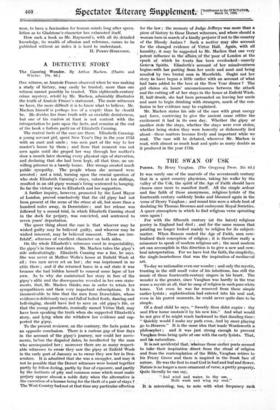A DETECTIVE STORY
The Canning Wonder. By Arthur Machen. (Chatto and Windus. 108. 6d.) ONE witness, as Anatole France observed when he was making a study of history, may easily be trusted ; more than one witness cannot possibly be trusted. This eighteenth-century crime mystery, retold by Mr. Machen, admirably illustrates the truth of Anatole France's statement. The more witnesses we have, the more difficult it is to know what to believe. Mr. Machen himself is perhaps less of a sceptic than he should be. He divides lies from truth with an enviable deeigiveness, but one of his readers at least is not content with the interpretation he puts upon the facts, and remains at the end of the book a forlorn parti.nn of Elizabeth Canning.
The central facts of the case are these. Elizabeth Canning, a young servant girl, spent New Year's Day in the year 1753 with an aunt and uncle ; was seen part of the way to her master's house by them ; and from that moment -was not seen again until she groped her way through her mother's door a month later showing every physical sign of starvation, and declaring that she- had been kept, all that time, an un- willing prisoner in a bawdy house. Her wrongs created much public sympathy. The people whom she accused were arrested ; and a trial, turning upon the crucial question of who stole Elizabeth Canning's. stays, valued at ten shillings, resulted in an old gipsy woman's being sentenced to hanging. So far the victory was to Elizabeth and her supporters,.
A further inquiry, however, promoted by the Lord Mayor of London, proved conclusively that the old gipsy had not been.present at the scene of the crime at all,.but more than a hundred miles away, in Dorsetshire ; and her release was followed by a second trial, in which Elizabeth Canning stood in the dock for perjury, was convicted, and sentenced to seven years' deportation.
The queer thing _about the case is that whoever may be wished guilty may be believed guilty, and whoever may be wished innocent, may be believed innocent. There are irre- futale: witnesses of excellent character on both sides.- - • On the whole Elizabeth's witnesses excel in respectability, the gipsy's in times and dates. Mr. Machen takes the gipsy's side unhesitatingly. Elizabeth Canning was a liar, he says. She was never at Mother Wells's house at Enfield Wash at all ; two men never set on her ; she was imprisoned in no attic there ; and if she returned home in a sad state it was because she had hidden herself to conceal some lapse of her own. As to why she maintained her story in face of the gipsy's alibi and the discrepancies revealed in her own state- ments, that, Mr. Machen thinks, was in order to retain her sympathizers and their very important subscriptions. It is inconceivable to him that the men from Dorsetshire, whose evidence is deliciously racy and full of boiled fowls, dancing and bell-ringing, should have lied to save an old gipsy's life, or that the young prostitute, ironically named Virtue Hall, may have been speaking the truth when she supported Elizabeth's story, and lying when she withdrew her evidence and sup- ported the gipsy.
To the present reviewer, on the contrary, the facts point to an opposite conclusion. There is a curious gap of four days in the account of-the gipsy's journey, nor could her move- ments, before the disputed dates, be recollected by the man who accompanied her ; moreover there are as many respect- able witnesses to swear they 'saw the gipsy at "Enfield Wash- in the early part of January as to swear they saw her in Don. setshire. It is admitted that she was a smuggler, and may it not be possible that the Dorset witnesses were bound together partly by fellow-feeling, partly by fear of exposure, and partly by the instincts of pity and common sense which must make perjury appear almost .a noble duty when the alternative is the execution of a human being for the theft of a pair of stays ? The West Country hactnot at that time any particular affection for the law ; the memory of Judge Jeffreys was more than a piece of histOry to those Dorset witnesses, and where should a woman turn in search of a kindly perjurer if not to the country of the Bloody Assizes 9 Such a motive may also account for the changed evidence of Virtue Hall. Again, with all , humility, it may be suggested to Mr. Machen that one very potent influence in the tiffiiittfOf The-poor of London at the epoch of_ which he . treats has been overlooked—namely Geneva Spirits. Elizabeth's account of her misadventures beginsrwith her parting from her uncle and aunt and being assailed by two brutal men in Moorfields. Ought not her story to have begun a "Mlle earlier with an account of what had been added to the beer at the. New Year dinner ? The girl claims six hoUrs' unconsciousness between the attack and the cutting off of her stays in the house at Enfield Wish. If, half drunk; she had been persuaded on leaving her uncle and aunt to begin drinking with Strangers, much of the con! fusion in her evidence may be. explained.
Mr. Machen states his side of the case with great energy and force, contriving to give the ancient cause celibre the excitement it had 'in its own day. Whether the gipsy or another stole the stays, whether the stays were ever stolen, whether being stolen. they were honestly or dishonestly lied about—these matters become lively and important while we read. The case will be debated, wherever Mr. Machen is read, with almost as much heat and quite as many doubts as it produced in the year 1753. •






























































 Previous page
Previous page